Plum Organics Lawsuit For Heavy Metals in Baby Food
- Last Updated: June 12th, 2025

Attorney Jessica Paluch-Hoerman, founder of TruLaw, has over 28 years of experience as a personal injury and mass tort attorney, and previously worked as an international tax attorney at Deloitte. Jessie collaborates with attorneys nationwide — enabling her to share reliable, up-to-date legal information with our readers.
Legally Reviewed
This article has been written and reviewed for legal accuracy and clarity by the team of writers and legal experts at TruLaw and is as accurate as possible. This content should not be taken as legal advice from an attorney. If you would like to learn more about our owner and experienced injury lawyer, Jessie Paluch, you can do so here.
Fact-Checked
TruLaw does everything possible to make sure the information in this article is up to date and accurate. If you need specific legal advice about your case, contact us by using the chat on the bottom of this page. This article should not be taken as advice from an attorney.
Key takeaways:
- The lawsuit against Plum Organics alleges that the company knowingly sold baby food products containing dangerous levels of heavy metals.
- This has prompted responses from regulatory bodies to address the widespread issue of heavy metal contamination in the industry.
- Families affected can join the lawsuit for potential compensation and to advocate for stricter baby food safety regulations.
Overview of the Plum Organics Lawsuit
On this page, we’ll provide an overview of the Plum Organics Lawsuit, allegations of heavy metal contamination in Plum Organics baby food, steps to file a Toxic Baby Food Lawsuit, and much more.
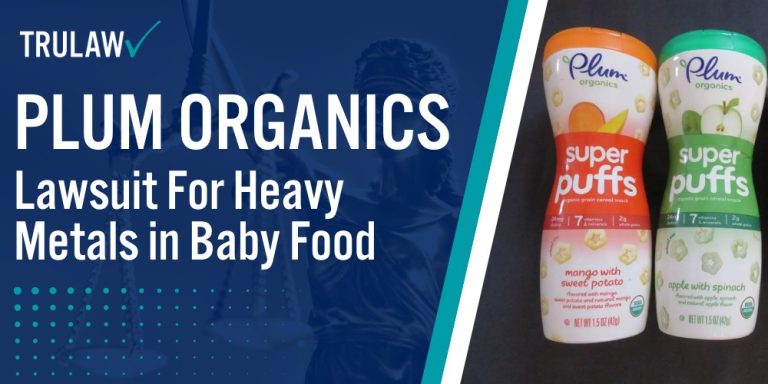
Intro to the Plum Organics Lawsuit
Heavy metal contamination has been detected in various Plum Organics products, such as:
- Grow Well Muscle
- Grow Well Tummy
- Little Teethers Blueberry
- Mighty Morning Bar Blueberry Lemon
- Mighty Snack Bars Strawberry
- Mighty Sticks Apple Carrot
- Super Puffs Apple with Spinach
- Super Puffs Blueberry with Purple Sweet Potato
- Super Puffs Mango with Sweet Potatoes
- Super Puffs Strawberry with Beet
- Teensy Snacks Berry
If your child has consumed Plum Organics baby food products and developed health issues such as neurological damage, decreased IQ, or behavioral problems, you may be eligible for compensation.
Contact TruLaw using the chat on this page to receive an instant case evaluation and determine your eligibility to join others in filing a Plum Organics baby food lawsuit today.
Table of Contents
Consolidation of Baby Food Heavy Metal Cases
The baby food industry has been rocked by a series of lawsuits alleging the presence of dangerous levels of heavy metals in products meant for infants and young children.
The Plum Organics lawsuit is a significant part of this larger legal landscape, joining forces with similar cases against other major baby food brands.
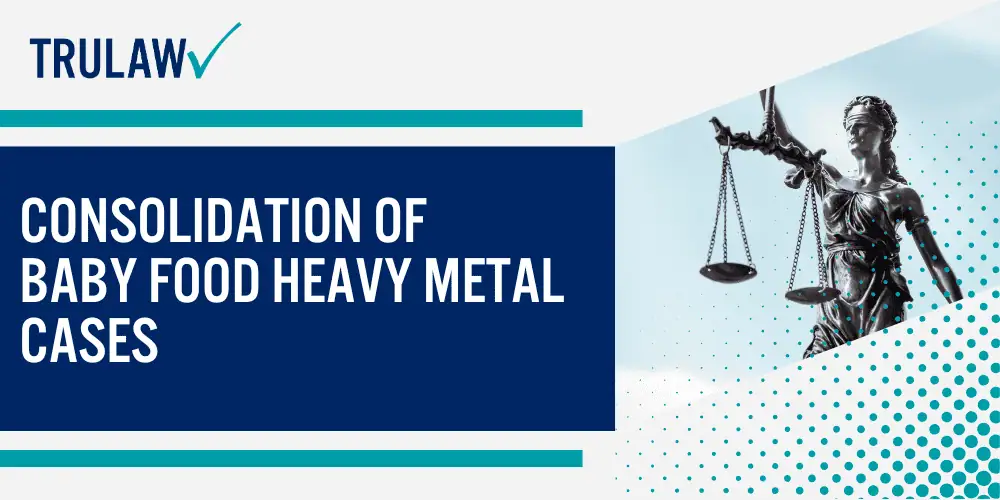
This consolidation represents a turning point in the fight for safer baby food products and highlights the widespread nature of the issue across multiple brands and product lines.
Plum Organics Lawsuit Joins Broader Baby Food Litigation
The plum baby food litigation is part of a broader legal action against several baby food companies accused of selling products with dangerous levels of heavy metals.
This consolidation marks a significant development in the ongoing struggle to hold companies accountable for the safety of their products.
The baby food class action lawsuit alleges that several companies, including Plum Organics (owned by the Campbell Soup Company), knowingly sold products containing high levels of toxic heavy metals.
The lawsuit alleges that Plum Organics knowingly sold products containing high levels of toxic heavy metals, such as:
- Arsenic;
- Lead;
- Cadmium; and
- Mercury.
The consolidation of these cases allows for a more streamlined legal process, enabling plaintiffs to pool resources and present a united front against the defendants.
This approach increases the efficiency of the litigation and potentially strengthens the overall case against the baby food manufacturers.
The Plum Organics lawsuit, now part of this larger legal action, highlights the widespread nature of the heavy metal contamination issue in the baby food industry.
Coordination Efforts Among Plaintiffs in Heavy Metal Cases
As the Plum Organics lawsuit progresses, coordination efforts among plaintiffs have intensified.
Legal teams representing families affected by heavy metal contamination in baby food are working together to build stronger cases.
This collaboration involves sharing information, expert testimonies, and legal strategies to present a comprehensive argument against the defendants.
The coordination extends beyond just the Plum Organics case, encompassing lawsuits against other major baby food manufacturers.
This united approach allows for a more thorough investigation into industry-wide practices and standards.
By working together, plaintiffs aim to uncover systemic issues within the baby food industry that may have led to the widespread presence of heavy metals in products marketed for infants and young children.
Allegations of Heavy Metal Contamination in Plum Organics Baby Food
At the heart of the Plum Organics lawsuit are serious allegations of heavy metal contamination in the company’s baby food products.
These claims have sent shockwaves through the baby food industry and raised significant concerns among parents and caregivers.
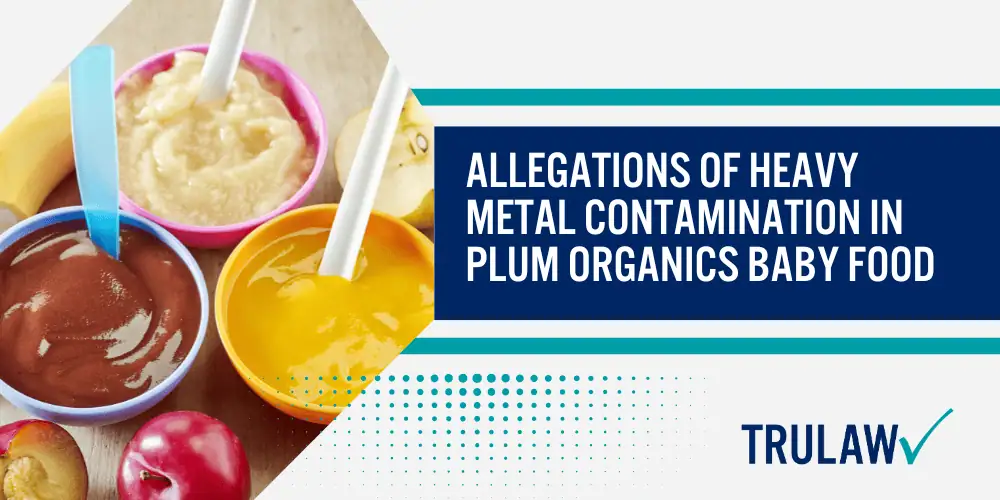
The lawsuit highlights the potential risks associated with these contaminants and questions the safety standards currently in place for baby food manufacturing.
Sources and Types of Heavy Metals Found in Plum Organics
The Plum Organics lawsuit centers around the presence of several toxic heavy metals in their baby food products.
Specifically, the lawsuit alleges that Plum Organics baby foods contain dangerous levels of arsenic, lead, cadmium, and mercury.
These heavy metals are known to pose serious health risks, particularly to infants and young children whose bodies and brains are still developing.
The sources of these heavy metals in baby food products are varied.
Some may come from contaminated soil where the ingredients are grown, while others might be introduced during the manufacturing process.
The lawsuit against Plum Organics claims that the company failed to take adequate steps to reduce the presence of these contaminants or inform consumers of the potential risks.
Independent testing has reportedly found concerning levels of these heavy metals in various Plum Organics products.
For instance, some products were found to contain inorganic arsenic at levels far exceeding the FDA’s proposed limit for infant rice cereal.
Similarly, lead levels in some Plum Organics products were allegedly many times higher than the maximum allowable levels set for bottled water by the FDA.
Health Risks Associated with Heavy Metals in Baby Food
The health risks associated with heavy metal exposure in infants and young children are severe and well-documented.
These toxic elements can have profound impacts on neurological development, potentially leading to long-term cognitive and behavioral issues.
The Plum Organics lawsuit emphasizes these risks as a key factor in seeking accountability from the company.
Exposure to heavy metals in baby food has been linked to several serious health issues:
- Decreased IQ, impaired cognitive development, and increased risk of behavioral problems
- Serious and irreversible neurological damage, even in small amounts
- Kidney damage and potential impacts on bone density
- Severe effects on the nervous system and hindered brain development, particularly in its organic form
- Other severe health issues
The lawsuit against Plum Organics argues that the company’s failure to adequately address these contaminants in its products has put countless children at risk of serious health issues.
The long-term consequences of early exposure to these heavy metals can be devastating, potentially affecting a child’s ability to learn, their behavior, and their overall quality of life.
If your child has consumed Plum Organics baby food products and developed health issues such as neurological damage, decreased IQ, or behavioral problems, you may be eligible for compensation.
Contact TruLaw using the chat on this page to receive an instant case evaluation and determine your eligibility to join others in filing a Plum Organics baby food lawsuit today.
Regulatory and Government Response to Plum Organics Lawsuit
The Plum Organics lawsuit has not only caught the attention of consumers and the media but has also prompted responses from regulatory bodies and government agencies.
These entities play a vital role in ensuring food safety and protecting public health.
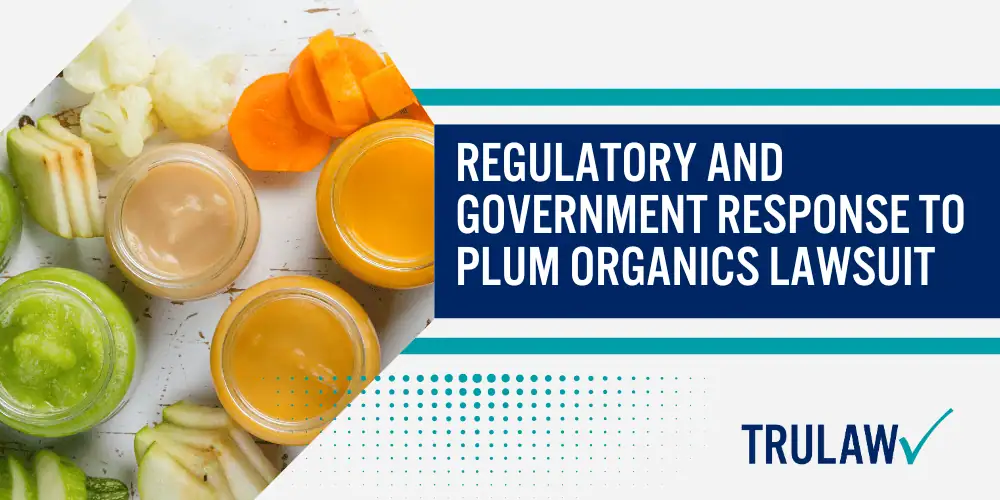
Their actions in response to the allegations against Plum Organics and other baby food manufacturers could have far-reaching implications for the industry as a whole.
FDA’s Role in Addressing Heavy Metal Contamination
The Food and Drug Administration (FDA) is central to regulating the safety of baby food products in the United States.
In light of the Plum Organics lawsuit and similar cases against other baby food manufacturers, the FDA has faced increased pressure to strengthen its oversight and enforcement of heavy metal limits in infant and toddler foods.
The FDA has acknowledged the issue of heavy metal contamination in baby foods and has taken some steps to address it.
In 2020, the agency announced its Closer to Zero action plan, which aims to reduce exposure to toxic elements from foods eaten by babies and young children.
This plan includes setting action levels for contaminants in key foods, increasing inspections and sampling of baby food products, and working with manufacturers to identify and implement best practices.
However, critics argue that the FDA’s response has been too slow and not stringent enough.
The Plum Organics lawsuit and similar legal actions have highlighted the need for more rigorous standards and enforcement.
As the litigation progresses, it may put additional pressure on the FDA to accelerate its efforts and potentially implement stricter regulations on heavy metal content in baby foods.
State-Level Responses to Plum Organics Baby Food Concerns
In addition to federal action, several states have taken their own steps to address the issue of heavy metals in baby food.
These state-level responses have been prompted in part by the Plum Organics lawsuit and similar cases, as well as growing public concern over the safety of baby food products.
Some states have proposed or passed legislation to set stricter limits on heavy metal content in baby food than those currently enforced at the federal level.
For example, California has considered a bill that would require baby food manufacturers to conduct regular testing for toxic metals and make the results publicly available.
Other states have launched their own investigations into baby food contamination, putting additional pressure on companies like Plum Organics to address these concerns.
These state-level actions complement the federal response and may serve to accelerate changes in the baby food industry.
They also provide additional avenues for holding companies accountable and ensuring the safety of baby food products.
Impact of Plum Organics Lawsuit on the Baby Food Industry
The Plum Organics lawsuit has sent ripples throughout the baby food industry, prompting significant changes and reevaluations of long-standing practices.
From manufacturing standards to market dynamics, the impact of this legal action extends far beyond the courtroom.
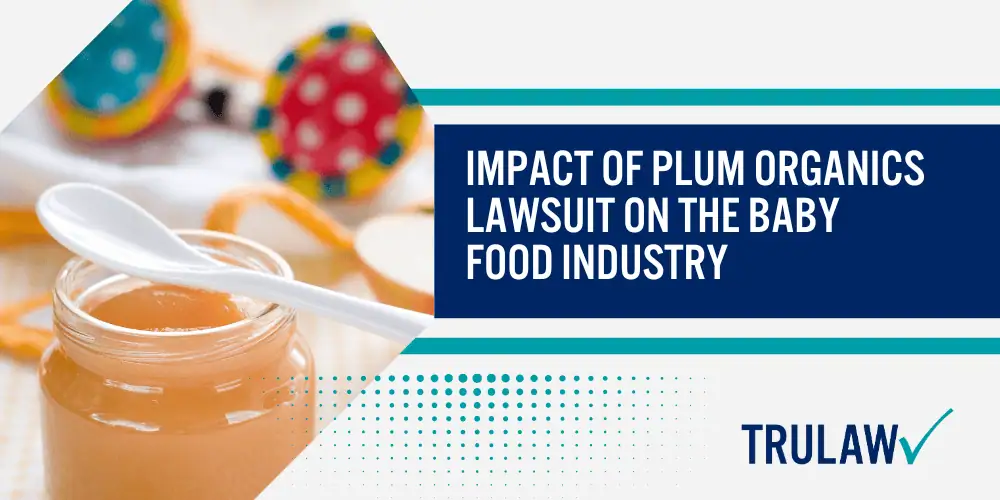
It has sparked a broader conversation about food safety, corporate responsibility, and the measures needed to protect our most vulnerable consumers.
Changes in Baby Food Manufacturing Standards Post-Lawsuit
The Plum Organics lawsuit, along with similar legal actions against other baby food manufacturers, has already begun to drive changes in the industry.
Many companies are reevaluating their manufacturing processes and ingredient sourcing to reduce the presence of heavy metals in their products.
This includes implementing more rigorous testing protocols, seeking out cleaner ingredient sources, and exploring new processing techniques that could help reduce contamination.
Some manufacturers have also started to voluntarily disclose more information about their testing processes and the levels of heavy metals found in their products.
This increased transparency is a direct response to the allegations raised in lawsuits like the one against Plum Organics, as companies seek to rebuild consumer trust.
Industry associations have also responded by developing new guidelines and best practices for reducing heavy metal contamination in baby foods.
While not legally binding, these voluntary standards acknowledge the issue and are a step towards industry-wide improvements.
Steps to File a Toxic Baby Food Lawsuit
As the Plum Organics lawsuit progresses, many consumers are left wondering about their options for recourse and potential compensation.
This section of the article explores the steps that affected families can take to join the lawsuit and outlines possible compensation scenarios.
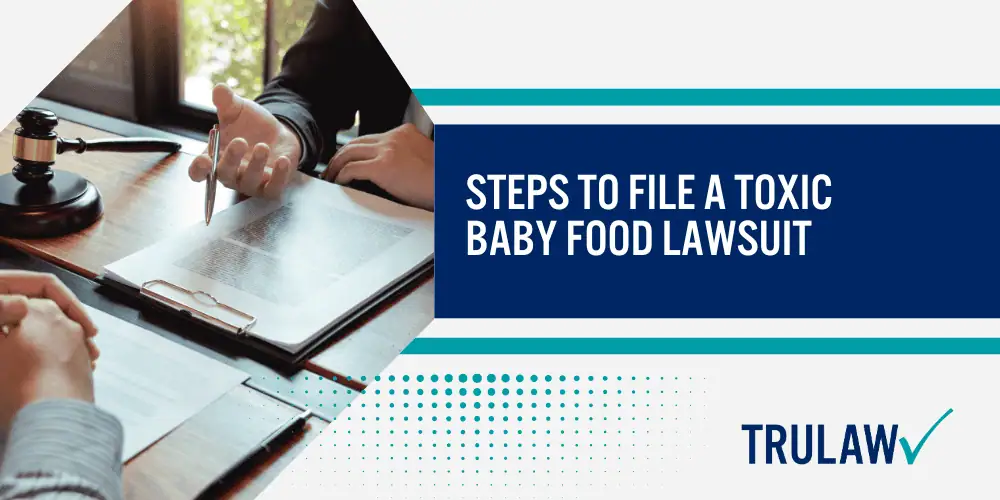
Consumers need to understand their rights and the potential outcomes of this legal action.
Affected Families Joining the Plum Organics Lawsuit
For families who believe they may have been affected by heavy metal contamination in Plum Organics baby food, there are several steps to consider for joining the lawsuit.
These steps are crucial for families to understand their rights and potential involvement in legal action.
Families considering joining the Plum Organics lawsuit should take the following steps:
- Gather any relevant documentation, including receipts and medical records
- Consult with a law firm experienced in product liability or class action lawsuits
- Understand whether they may be automatically included in a class action lawsuit
- Stay informed about the progress of the lawsuit through reputable sources
- Consider the potential long-term implications of participation in the lawsuit
These actions can help families understand their legal rights and determine if they qualify to join the lawsuit.
It’s important to note that the process of joining a lawsuit can be complex, and seeking professional legal advice is often beneficial.
As the Plum Organics case progresses, staying informed will be key for affected families to make timely decisions about their involvement.
Potential Compensation and Settlement Outcomes
The potential compensation and settlement outcomes for the Plum Organics lawsuit are still uncertain, as the case is ongoing.
However, based on similar lawsuits in the past, several possible forms of compensation that affected families might receive if the lawsuit is successful are listed below.
Compensation could include reimbursement for the cost of Plum Organics products purchased, coverage of medical expenses related to heavy metal exposure, and potentially additional damages for pain and suffering or long-term health effects.
In some cases, settlements might also include non-monetary components, such as requirements for Plum Organics to change its manufacturing processes or increase transparency about its products.
It’s important to note that the process of reaching a settlement or verdict in such a complex case can be lengthy.
Even if a settlement is reached or a verdict is delivered in favor of the plaintiffs, the distribution of any compensation could take considerable time.
If your child has consumed Plum Organics baby food products and developed health issues such as neurological damage, decreased IQ, or behavioral problems, you may be eligible for compensation.
Contact TruLaw using the chat on this page to receive an instant case evaluation and determine your eligibility to join others in filing a Plum Organics baby food lawsuit today.
Future Implications of Plum Organics Lawsuit
The Plum Organics lawsuit addresses past issues and has significant implications for the future of the baby food industry and food safety regulations as a whole.
This section explores the potential long-term effects of the lawsuit, including its impact on regulations and ongoing advocacy efforts for safer baby food products.
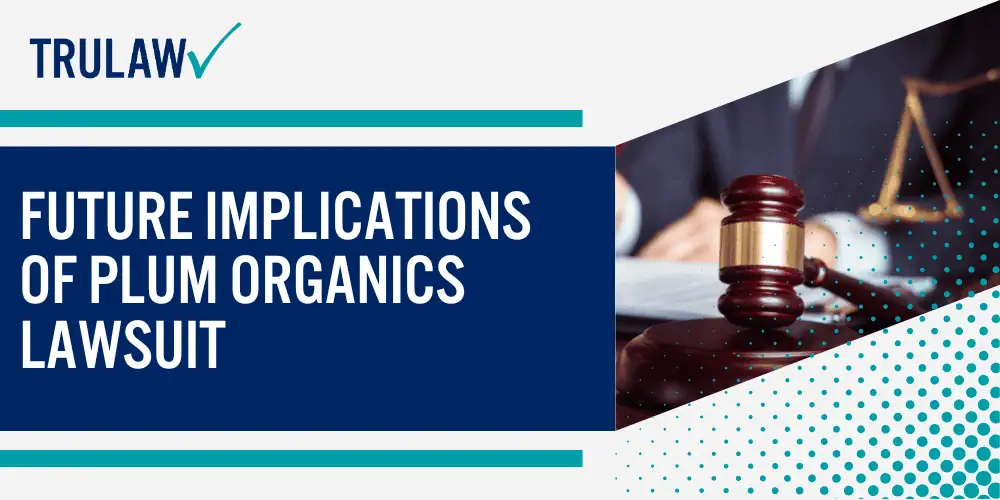
Understanding these future implications is essential for both consumers and industry stakeholders.
Long-term Effects on Baby Food Safety Regulations
The Plum Organics lawsuit, along with similar legal actions against other baby food manufacturers, is likely to have long-lasting effects on baby food safety regulations.
These cases have brought significant attention to the issue of heavy metal contamination in baby foods, potentially accelerating regulatory changes at both the federal and state levels.
In the long term, we may see the implementation of stricter limits on heavy metal content in baby foods, more frequent and rigorous testing requirements, and increased oversight of baby food manufacturing processes.
The FDA’s Closer to Zero action plan may be expedited or expanded in response to the ongoing litigation and public concern.
These regulatory changes could extend beyond just heavy metals to encompass other potential contaminants in baby foods, leading to a broader overhaul of food safety standards for products aimed at infants and young children.
The Plum Organics lawsuit may thus serve as a catalyst for significant improvements in the overall safety and quality of baby food products.
Advocacy for Stricter Heavy Metal Limits in Baby Food
The Plum Organics lawsuit has energized advocacy efforts for stricter heavy metal limits in baby food.
Consumer groups, health organizations, and concerned parents are using the momentum generated by this and similar lawsuits to push for more stringent regulations and increased transparency in the baby food industry.
These advocacy efforts are likely to continue and potentially intensify in the coming years.
They may focus on pressuring regulatory agencies to set lower acceptable limits for heavy metals in baby foods, pushing for more frequent and comprehensive testing, and demanding greater transparency from manufacturers about the content of their products.
The lawsuit has also raised parents’ awareness of the importance of understanding what goes into their children’s food.
This increased consumer awareness and demand for safer products may drive further changes in the industry, even beyond what is mandated by regulations.
The U.S. House Committee on Oversight and Reform Subcommittee on Economic and Consumer Policy has also played a significant role in investigating this issue, highlighting the need for stronger regulations to protect reasonable consumers.
Toxic Baby Food Lawsuit Frequently Asked Questions
-
What is the Plum Organics lawsuit about?
The Plum Organics lawsuit alleges that the company knowingly sold baby food products containing high levels of toxic heavy metals such as arsenic, lead, cadmium, and mercury.
These heavy metals pose serious health risks to infants and young children whose bodies and brains are still developing.
-
What are the potential health risks associated with heavy metals in baby food?
Exposure to heavy metals in baby food has been linked to decreased IQ, impaired cognitive development, and increased risk of behavioral problems.
It can also cause serious and irreversible neurological damage, kidney damage, and other severe health issues.
-
How has the FDA responded to the issue of heavy metal contamination in baby food?
The Food and Drug Administration (FDA) has acknowledged the issue of heavy metal contamination in baby foods and announced its Closer to Zero action plan to reduce exposure to toxic elements.
However, critics argue that the FDA’s response has been too slow and not stringent enough.
-
What steps can affected families take to join the Plum Organics lawsuit?
Families who believe they may have been affected by heavy metal contamination in Plum Organics baby food should gather relevant documentation, consult with an experienced law firm, and stay informed about the progress of the lawsuit.
If your child has consumed Plum Organics baby food products and developed health issues such as neurological damage, decreased IQ, or behavioral problems, you may be eligible for compensation.
Contact TruLaw using the chat on this page to receive an instant case evaluation and determine your eligibility to join others in filing a Plum Organics baby food lawsuit today.
-
What are the potential long-term effects of the Plum Organics lawsuit on baby food safety regulations?
The Plum Organics lawsuit, along with similar legal actions against other baby food manufacturers, is likely to have long-lasting effects on baby food safety regulations.
It may lead to stricter limits on heavy metal content, more rigorous testing requirements, and increased oversight of baby food manufacturing processes.

Managing Attorney & Owner
With over 25 years of legal experience, Jessica Paluch-Hoerman is an Illinois lawyer, a CPA, and a mother of three. She spent the first decade of her career working as an international tax attorney at Deloitte.
In 2009, Jessie co-founded her own law firm with her husband – which has scaled to over 30 employees since its conception.
In 2016, Jessie founded TruLaw, which allows her to collaborate with attorneys and legal experts across the United States on a daily basis. This hypervaluable network of experts is what enables her to share the most reliable, accurate, and up-to-date legal information with our readers!
Additional Toxic Baby Food Lawsuit resources on our website:
Here, at TruLaw, we’re committed to helping victims get the justice they deserve.
Alongside our partner law firms, we have successfully collected over $3 Billion in verdicts and settlements on behalf of injured individuals.
Would you like our help?
At TruLaw, we fiercely combat corporations that endanger individuals’ well-being. If you’ve suffered injuries and believe these well-funded entities should be held accountable, we’re here for you.
With TruLaw, you gain access to successful and seasoned lawyers who maximize your chances of success. Our lawyers invest in you—they do not receive a dime until your lawsuit reaches a successful resolution!
AFFF Lawsuit claims are being filed against manufacturers of aqueous film-forming foam (AFFF), commonly used in firefighting.
Claims allege that companies such as 3M, DuPont, and Tyco Fire Products failed to adequately warn users about the potential dangers of AFFF exposure — including increased risks of various cancers and diseases.
Depo Provera Lawsuit claims are being filed by individuals who allege they developed meningioma (a type of brain tumor) after receiving Depo-Provera birth control injections.
A 2024 study found that women using Depo-Provera for at least 1 year are five times more likely to develop meningioma brain tumors compared to those not using the drug.
Suboxone Tooth Decay Lawsuit claims are being filed against Indivior, the manufacturer of Suboxone, a medication used to treat opioid addiction.
Claims allege that Indivior failed to adequately warn users about the potential dangers of severe tooth decay and dental injuries associated with Suboxone’s sublingual film version.
Social Media Harm Lawsuits are being filed against social media companies for allegedly causing mental health issues in children and teens.
Claims allege that companies like Meta, Google, ByteDance, and Snap designed addictive platforms that led to anxiety, depression, and other mental health issues without adequately warning users or parents.
Transvaginal Mesh Lawsuits are being filed against manufacturers of transvaginal mesh products used to treat pelvic organ prolapse (POP) and stress urinary incontinence (SUI).
Claims allege that companies like Ethicon, C.R. Bard, and Boston Scientific failed to adequately warn about potential dangers — including erosion, pain, and infection.
Bair Hugger Warming Blanket Lawsuits involve claims against 3M — alleging their surgical warming blankets caused severe infections and complications (particularly in hip and knee replacement surgeries).
Plaintiffs claim 3M failed to warn about potential risks — despite knowing about increased risk of deep joint infections since 2011.
Baby Formula NEC Lawsuit claims are being filed against manufacturers of cow’s milk-based baby formula products.
Claims allege that companies like Abbott Laboratories (Similac) and Mead Johnson & Company (Enfamil) failed to warn about the increased risk of necrotizing enterocolitis (NEC) in premature infants.
Here, at TruLaw, we’re committed to helping victims get the justice they deserve.
Alongside our partner law firms, we have successfully collected over $3 Billion in verdicts and settlements on behalf of injured individuals.
Would you like our help?
